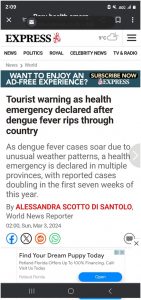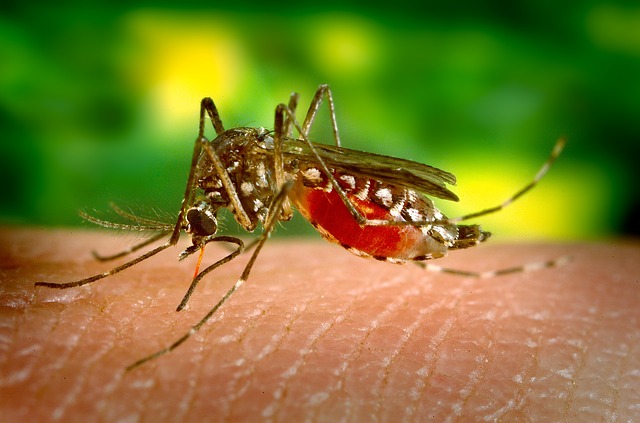Hegelian Playbook, page 666: How To Manufacture A Dengue Outbreak:
Step 1. Use helicopter flights to dump 2.4 billion genetically modified GMO, Bill Gates-backed mosquitoes throughout the world. What could go wrong?
Step 2. Watch dengue cases go up, but don’t acknowledge the connection with GMO mosquitoes. Instead, blame climate change.
Step 3. Declare a state of public health emergency.
Step 4. Create need/demand to spray more toxins deploy a new Bill Gates-backed vaccine
Currently, the world is experiencing more than one dengue fever outbreak. In fact, there are several outbreaks erupting around the world. Countries include Columbia, Costa Rica, Haiti, Jamaica, Paraguay, Panama and several more island nations. I can go on.
The rise has been “explosive.”
A website called PrecisionVaccinations.com recently reported that 18 vacation destinations are listed as “dengue hotspots,” while the CDC warned on March 1 that “traveler’s dengue fever” is now a health risk.
 In the first two months of this year, Paraguay registered nearly 100,000 suspected cases — more than five times the typical rate. Peru, racked by its own outbreak, declared an emergency in much of the country. Argentina, too, has seen an explosion of cases.
In the first two months of this year, Paraguay registered nearly 100,000 suspected cases — more than five times the typical rate. Peru, racked by its own outbreak, declared an emergency in much of the country. Argentina, too, has seen an explosion of cases.
Meanwhile, California, Arizona, and Texas are also detecting local transmission of dengue fever. The same dynamic is being seen in southern Europe, where dozens of cases were recorded last year.
 Dengue virus (DENV), transmitted by mosquitoes, typically infects an estimated 100 million people annually. The virus has four serotypes. Exposure to one serotype generally causes mild illness and provides lifetime immunity from infections of the same serotype. However, subsequent exposure to a second dengue serotype can result in more severe presentations that can lead to hemorrhagic fever, shock, and even death.
Dengue virus (DENV), transmitted by mosquitoes, typically infects an estimated 100 million people annually. The virus has four serotypes. Exposure to one serotype generally causes mild illness and provides lifetime immunity from infections of the same serotype. However, subsequent exposure to a second dengue serotype can result in more severe presentations that can lead to hemorrhagic fever, shock, and even death.
“Cases of dengue fever are rising at an alarming rate,” said Gabriela Paz-Bailey, who specializes in dengue at the Centers for Disease Control and Prevention. “It’s becoming a public health crisis and coming to places that have never had it before.”
Is it normal to have simultaneous outbreaks? What is going on?
Experts blame climate change. An extraordinary heat wave collided with El Niño, which often coincides with greater dispersion of dengue, leading to wider proliferation of the A. aegypti mosquito and elongating its life span. The El Nino event that arrived in mid-2023 is predicted to last until at least April, intensifying the heat and rainfall and thus contributing to the surge of dengue.
But are there other variables going on?
NEW Mosquito Central
“Inside a two-story brick building in Medellín, Colombia, scientists work long hours in muggy labs to breed millions of mosquitoes. They tend to the insects’ every need as they grow from larvae to pupae to adults, keeping the temperature just right and feeding them generous helpings of fishmeal, sugar, and, of course, blood.
Then, they release them across the country to breed with wild mosquitoes that can carry dengue and other viruses threatening to sicken and kill the population.
“This might sound like the beginning of a Hollywood writer’s horror film plot. But it’s not. This factory is real.”
This is a real quote from Bill Gates, writing in his blog in August 2022.
The World Mosquito Program has bred a type of mosquito that carries Wolbachia. This virus-blocking bacteria prevents these mosquitoes and their offspring from spreading illnesses like malaria and dengue. The idea is that by releasing them to reproduce with wild mosquitoes, they spread the bacteria, reducing virus transmission and “protecting millions of people from illnesses.”
“These results are a huge breakthrough, offering proof that this new technology will protect entire cities and countries against the threat of mosquito-borne diseases,” writes Gates.
The primary company involved in producing Wolbachia-infected mosquitoes for vector control purposes is the World Mosquito Program (WMP). Interestingly, ChatGPT calls it a company when it is actually a global initiative that collaborates with research institutions, governments, and local communities. Notably, the World Mosquito Program, owned by Monash University, received a $50 million grant from the Bill & Melinda Gates Foundation. Their methods are aligned with the United Nations’ Sustainable Development Goals, and they have staff working in countries across Oceania, Asia, Europe, and the Americas, with offices established in Australia, Vietnam, France, and Panama.
Beginning in 2024, the factory began mass-producing five billion mosquitoes per year. The WMP is releasing these mosquitoes in 11 countries: Brazil, Colombia, Mexico, Indonesia, Sri Lanka, Vietnam, Australia, Fiji, Kiribati, New Caledonia, and Vanuatu.
Mutating Flying Syringes
A January 2024 article claims that synthetic biology shows promise in reducing mosquito-borne diseases. In addition to insecticides, there are several “genetic biocontrol methods.” For instance, the Sterile Insect Technique (SIT), has long been used as a method for pest control; it relies on the wide release of insects that have been rendered impotent, usually through radiation. However, one concern is that released females, although sterile, will still be able to transmit the disease. The main SIT system was developed in partnership with MosquitoMate and Verily. Verily is a subsidiary of Google. There are also “gene-drive” technologies such as Oxitec OX5034 mosquitoes. MosquitoMate is also involved in producing and deploying Wolbachia-infected mosquitoes for vector control.
“Thanks to numerous genetic tools that have been developed to manipulate mosquito genomes, scientists have been able to transfer foreign genes into the mosquito germline through microinjection,” per an article titled Advances and challenges in synthetic biology for mosquito control.
Scientists maintain that safety, societal factors, and public acceptance are keys to success, and yet these gene-edited mosquitoes have already been dumped from the sky and are in circulation.
In a nutshell, this ‘novel’ approach to decreasing dengue incidence involves the introduction of a bacterium called Wolbachia that blocks dengue virus transmission into populations of the primary vector mosquito, Aedes aegypti. 
The intent is to have the modified mosquitoes mate with female mosquitoes and pass on a genetic change in a protein that would render any female offspring unable to survive — thus reducing the population of the insects that transmit disease. Female mosquitoes will die, while males will reproduce and spread the self-limiting gene to the next generation, eventually leading to population declines.
University of Kentucky entomologist Stephen Dobson patented how to make Wolbachia-carrying mosquitoes back in 2005 before founding MosquitoMate. The DARPA-funded mutant mosquito experimental process involving Wolbachia is straight-up Frankenstein gain of function sorcery, involving green monkey cells, and mice monoclonal antibodies.
I admit I’ll kill a mosquito that tries to bite me, but the scientists arguably tortured these insects.
Interested in further details and reading the next chapter of this sci fi horror story?
Read Part 2 here.
++++++++++++++++++++++++++++++++++++++++++++++++++++++++++++++++++++++
 Like what you’re reading on The Tenpenny Report? Share this article with your friends. Help us grow.
Like what you’re reading on The Tenpenny Report? Share this article with your friends. Help us grow.
Get more of Dr. Tenpenny’s voice of reason at her website.
Join our list here
Make a donation here (and thank you!)
++++++++++++++++++++++++++++++++++++++++++++++++++++++++++++++++++++++
Maryam Henein is an investigative journalist, and founder, and editor-in-chief of the health magazine and marketplace HoneyColony. Read her Substack here. She is also a functional medicine consultant/coach, and the director of the award-winning documentary film Vanishing of the Bees, narrated by Elliot Page. Follow her on Twitter @maryamhenein. Email her: maryam@honeycolony.com.

